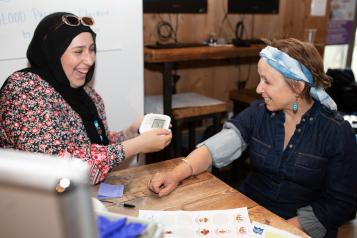Islington residents share feedback on how their health conditions affect their activity levels

I have lupus and arthritis which limits my ability to exercise without experiencing pain.
We work with a range of local organisations supporting communities experiencing health inequalities. As the Diverse Communities Health Voice partnership, we work together to gather insight from residents.
This year, we've been talking to people living with long-term health conditions. We wanted to hear how their health affected their ability to exercise and their attitude towards physical activity.
339 of the 504 people who answered our survey questions participated in physical activity that raised their breathing or heart rate at least once a week, with walking by far the most common activity. Other physical activities included housework, gardening, and pushing a buggy. Fitness activities included swimming, football, tennis, badminton, Zumba, Pilates, exercise with weights, exercise prescribed by physiotherapists, yoga, running, prostate exercises, chair exercises, skipping, push-ups, and exercise classes.
“I used to walk lots as I felt good and was strong. But since my lung disease started and I had the two operations, I am unable to walk for long as I become dizzy and feel very weak and likely to fall. But still, I try to walk as much as possible but slowly and with stops and rest.”
What we learned
-
the mental health benefits associated with physical activity, such as improved mood and a sense of wellbeing were what these residents found most valuable, even more than the physical health benefits.
-
274 participants said that worries about their physical health prevented them from becoming more active. 158 participants felt that low motivation made it difficult.
-
People said they were often unsure of the appropriateness of different types of activity and wanted more direction from health professionals.
-
When asked to select from a list up to three actions that would encourage them to become more active, 290 participants picked 'Advice from a health professional'. The next most popular response was 'Advice from a trusted person in my community', chosen by 153 people.
Where residents with health conditions wanted to become more active, what would help?
Our Diverse Communities Health Voice partners also felt that the offer for discounted gym membership needed to be better communicated to residents. Access to women-only swimming lessons and to low cost/affordable swimming lessons needed to be better as well. This would be particularly helpful for those adults with long-term conditions who don’t know how to swim but would benefit from this low-impact exercise.
Find out more
Read our full report 'Islington patients managing long-term conditions give feedback on their annual health checks and patterns of physical activity'.


